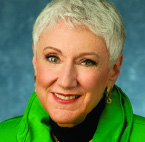Hadassah
President's Column
1914 & 2014
 The guns began firing 100 years ago this summer. World War I not only changed the global political landscape—and set the stage for World War II—it also had a profound impact on the Zionist movement, the American Jewish community and the development of Hadassah.
The guns began firing 100 years ago this summer. World War I not only changed the global political landscape—and set the stage for World War II—it also had a profound impact on the Zionist movement, the American Jewish community and the development of Hadassah.
The British capture of Palestine in the war’s final year certainly facilitated the emergence of Israel three decades later, but that is just the tip of this historic iceberg. Until 1914, the most consequential part of the Zionist movement was in Europe. The war cut the continent to pieces, disrupting the communication and travel crucial to Zionism’s work.
Into the void stepped the youngest Jewish community on the globe. There were already two and a half million Jews in the United States (roughly equal to the Jewish population of the Austro-Hungarian Empire), but the American community was spread widely and consisted of mostly recent immigrants, many of whom were still struggling with English. Suddenly, our grandparents and great-grandparents had to shoulder the responsibility of the movement to build a Jewish state.
Both American Jewry and Hadassah stepped into the larger roles they were called on to play. In 1916, the World Zionist Organization decided that the yishuv needed a mobile hospital and asked the Federation of American Zionists to take responsibility for the project. To the neophytes in the federation, the two nurses Hadassah had dispatched to Jerusalem in 1913 amounted to experience in medical mobilization. We were the experts. That mobile hospital—the American Zionist Medical Unit—grew into the Hadassah Medical Organization.
The landscape that Hadassah did so much to shape has brought about its own changes. In recent decades, the dynamics of the Jewish world have changed again, not because of war but because of the phenomenal success of the Zionist enterprise. A mature and confident Israel now has the world’s largest Jewish population and has taken on the leading role it was designed to play in Jewish civilization. Where the Israel-diaspora relationship once involved one-way aid, it is now a more equal partnership. Among other things, Israel today contributes millions of dollars to Jewish education around the world, including in America.
For the past year, the Hadassah Medical Organization has been dealing with a crisis that is a result of a specific set of financial conditions that emerged over a relatively brief time. But the discussions over how to resolve the crisis are a product of this changed dynamic in the Jewish world. Though we hope to run the flagship hospital of Israeli medicine for generations to come, the conversation is a reminder that the ideal roles for Hadassah in the Israel-diaspora partnership have changed over time.
One constant has been producing Jewish leaders. Our Hadassah Leadership Fellows program, launched in 2013, is a new dimension of that effort. We have been at the forefront of the American Jewish renaissance—including opening up leadership roles for women—and the American relationship with Israel. As long as sustaining Israel and strengthening the Jewish people remain part of our value system, we will be central to the Jewish future.
We don’t have to have a clear vision of what the world will look like 100 years from now, any more than our founding generation knew in 1914 where their efforts would lead Hadassah. It is enough to maintain our determination to strengthen our mission in a changing world.
We’ll be discussing that mission at our national convention in Las Vegas, July 21 to 23. It will be a gathering of Hadassah leaders past, present and future. I hope to see all of you there.
Hadassah has made history, but it is equally true that history has made Hadassah. Our formation of the mobile hospital that grew into HMO was only the first of many instances when history called on us to fill a critical need. Knowing what happened 100 years ago and how we stepped up to the challenge is good preparation for facing the challenges of today and being ready for what comes tomorrow.










 Facebook
Facebook Instagram
Instagram Twitter
Twitter
Leave a Reply